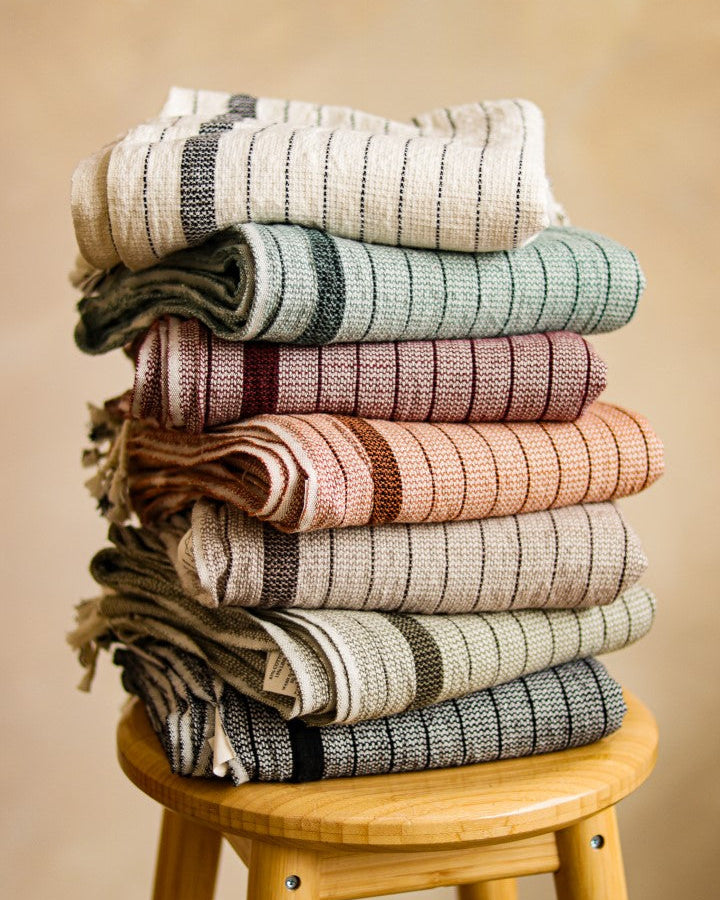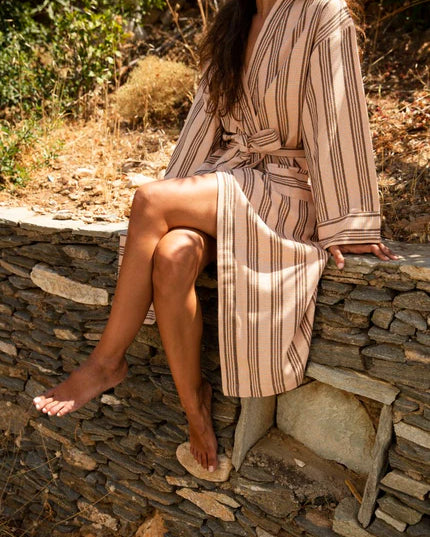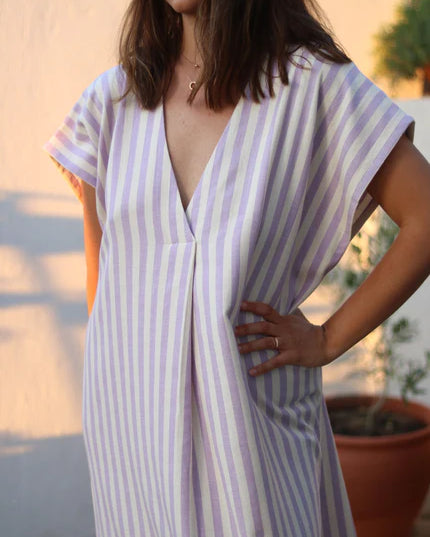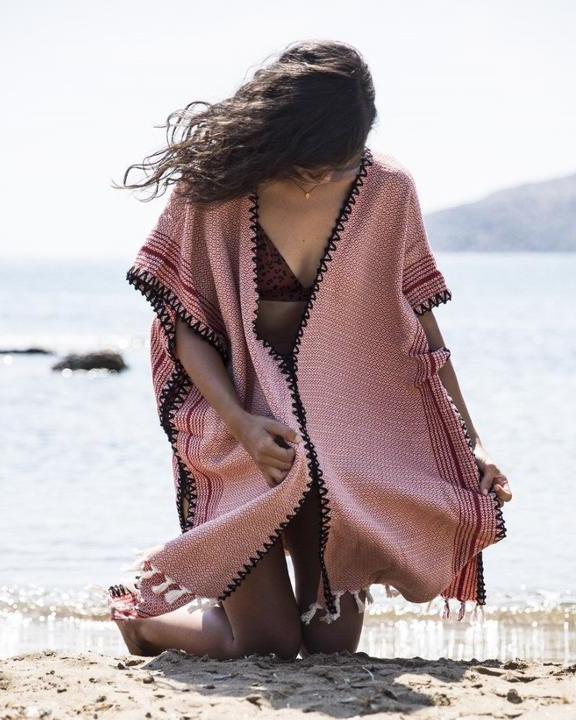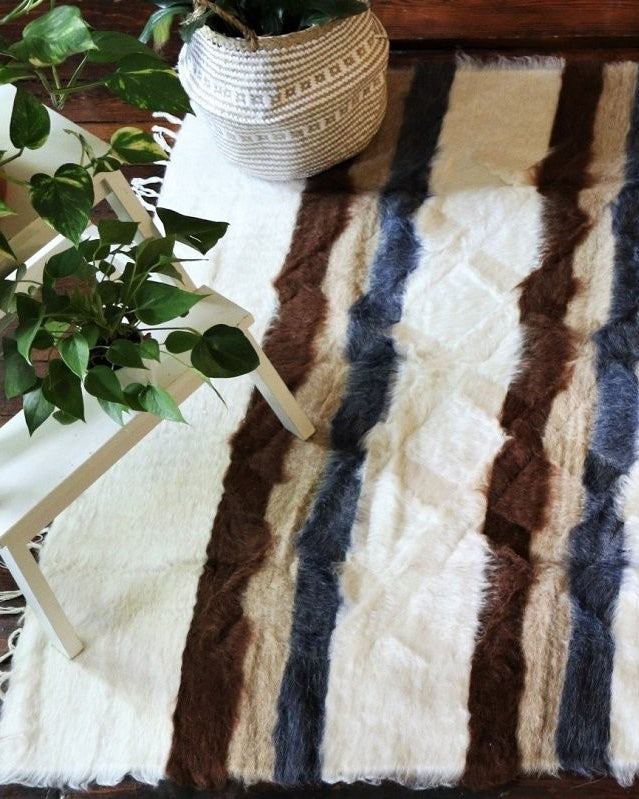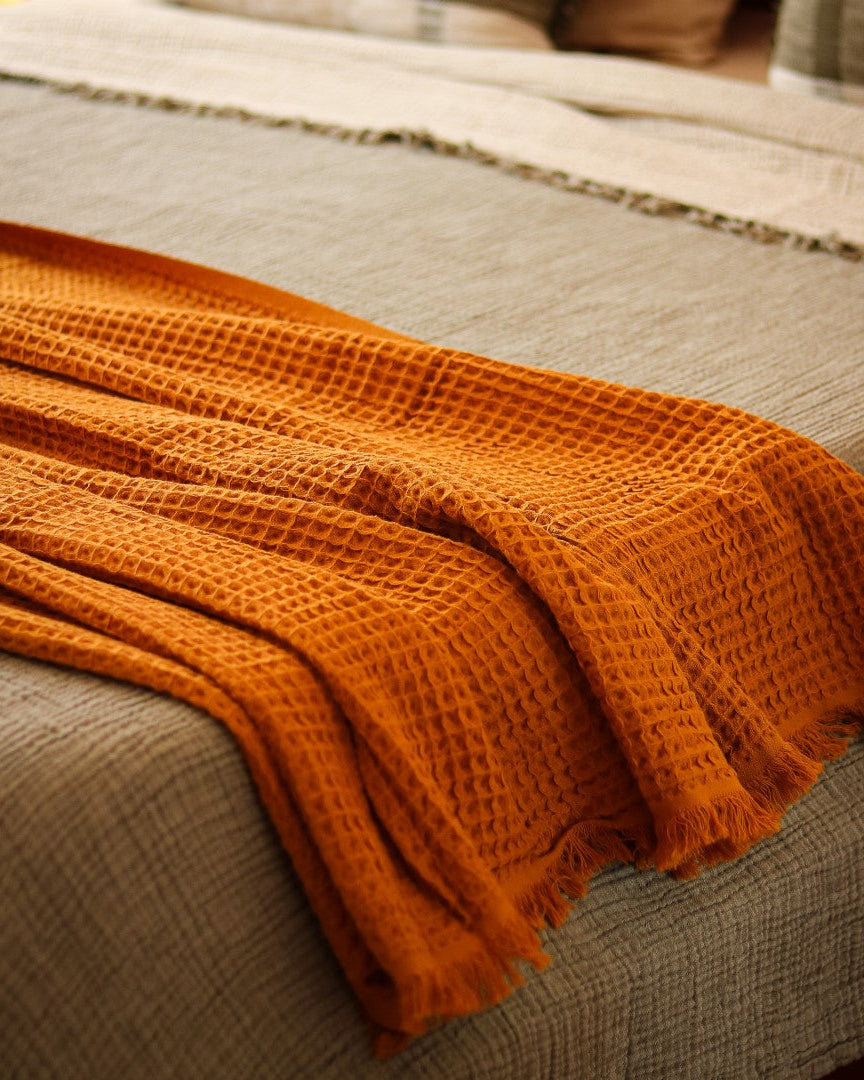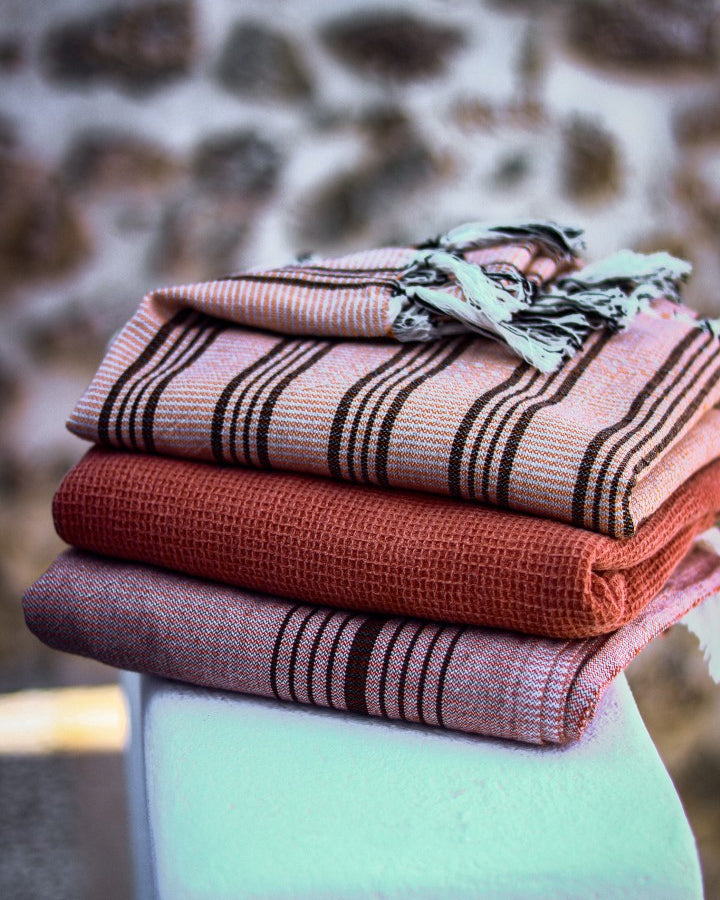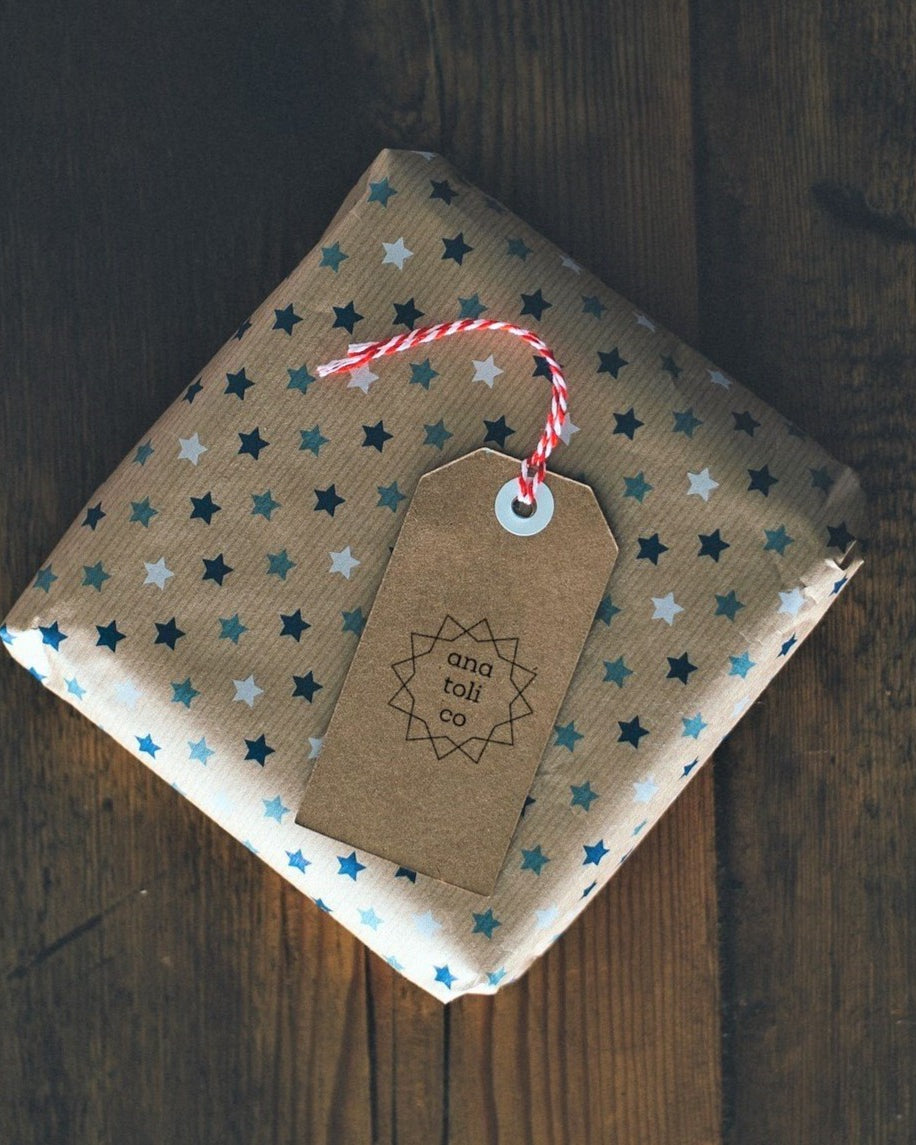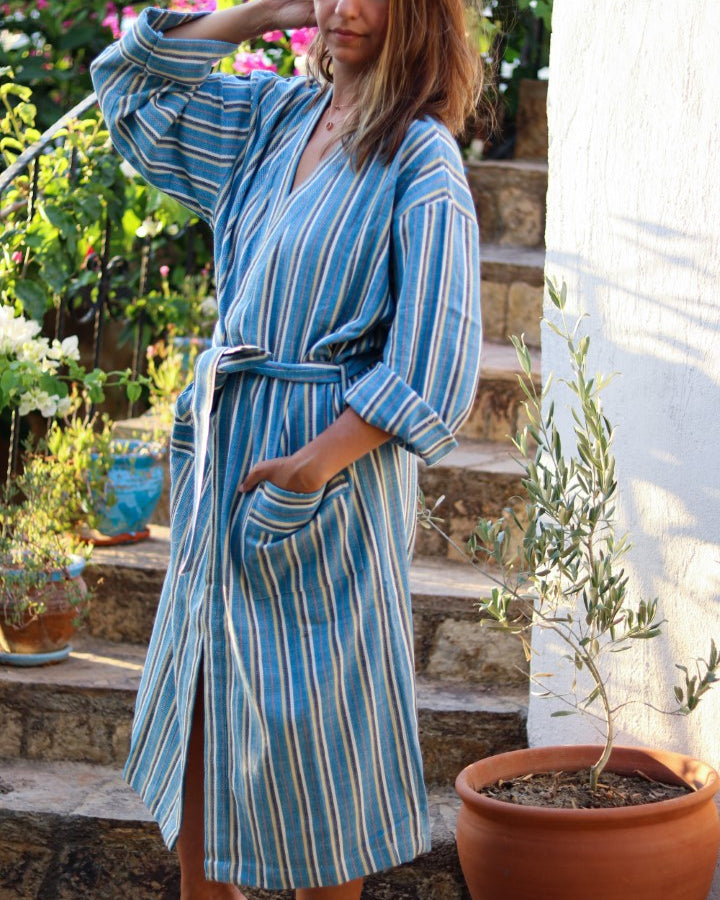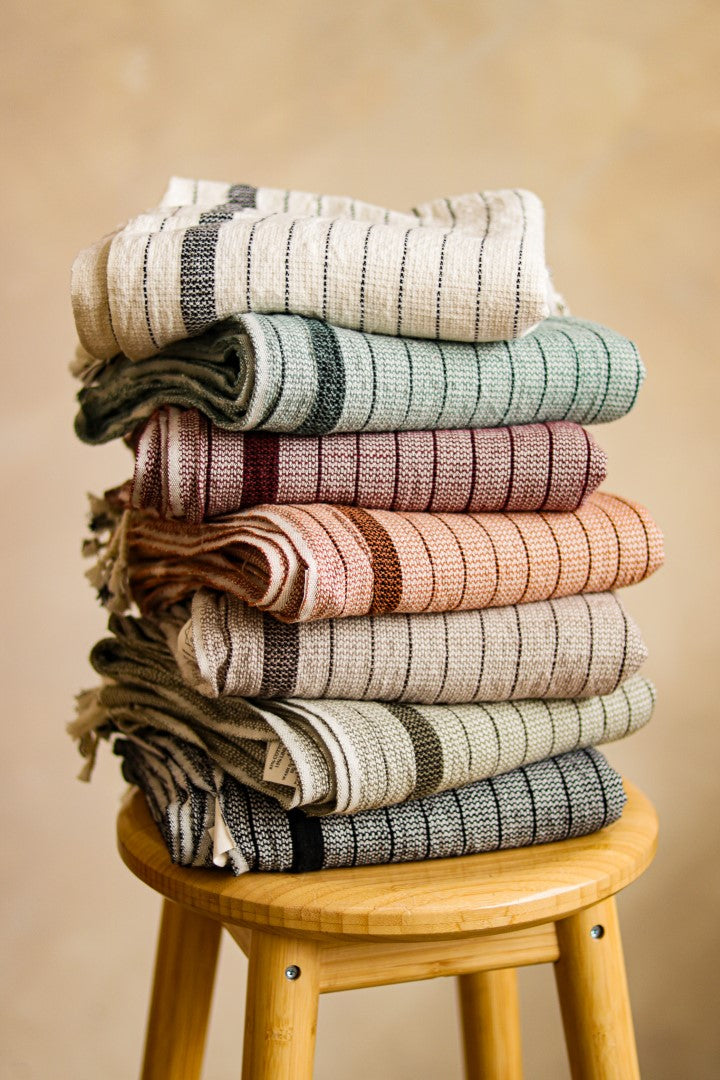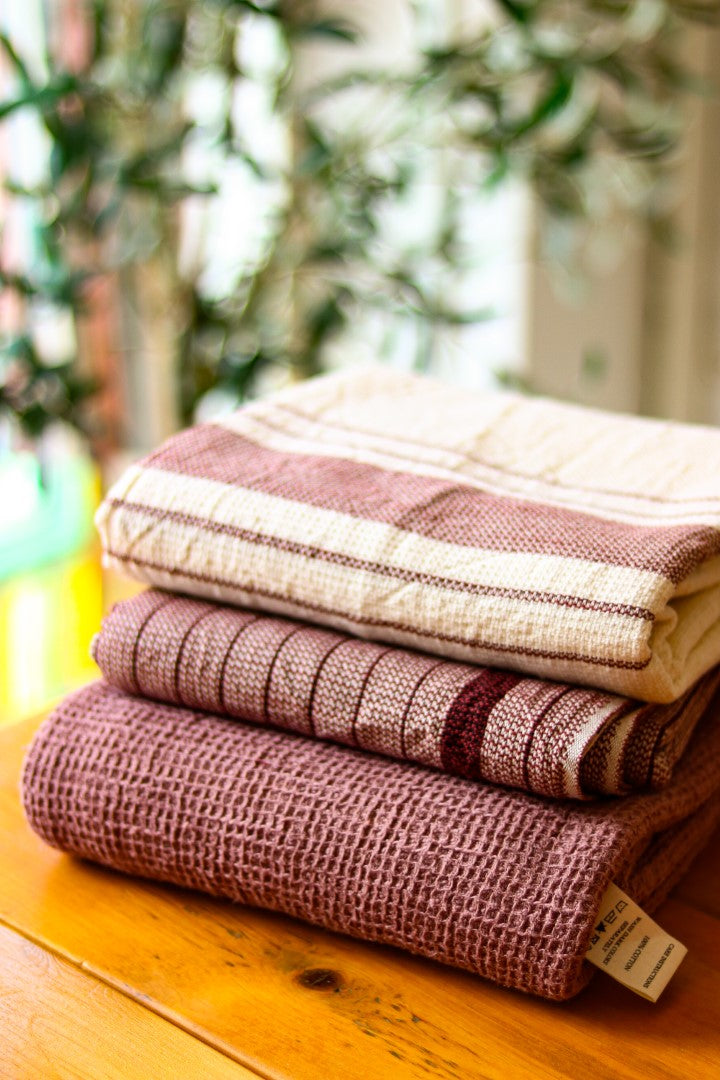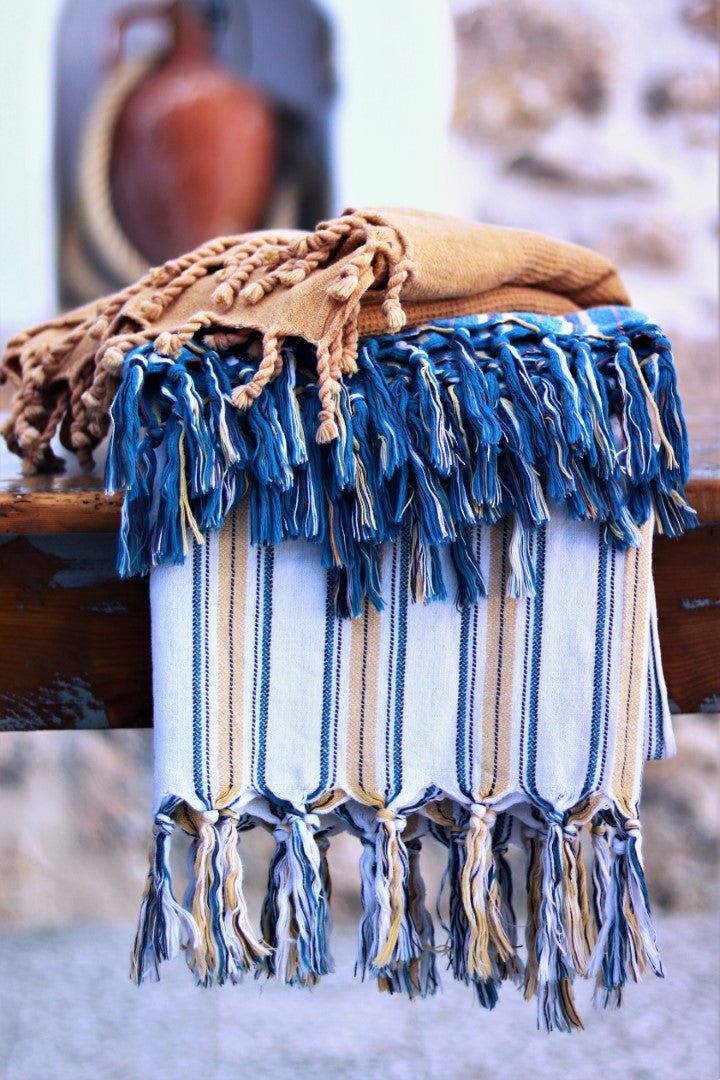When you hear "Turkish cotton," you're hearing about a specific type of premium, long-fiber cotton grown exclusively in the Aegean region of Turkey. For those in the know, it’s the benchmark for high-quality towels, robes, and home textiles—the kind that feel incredible and just plain work better.
The Secret to Turkish Cotton's Legendary Softness
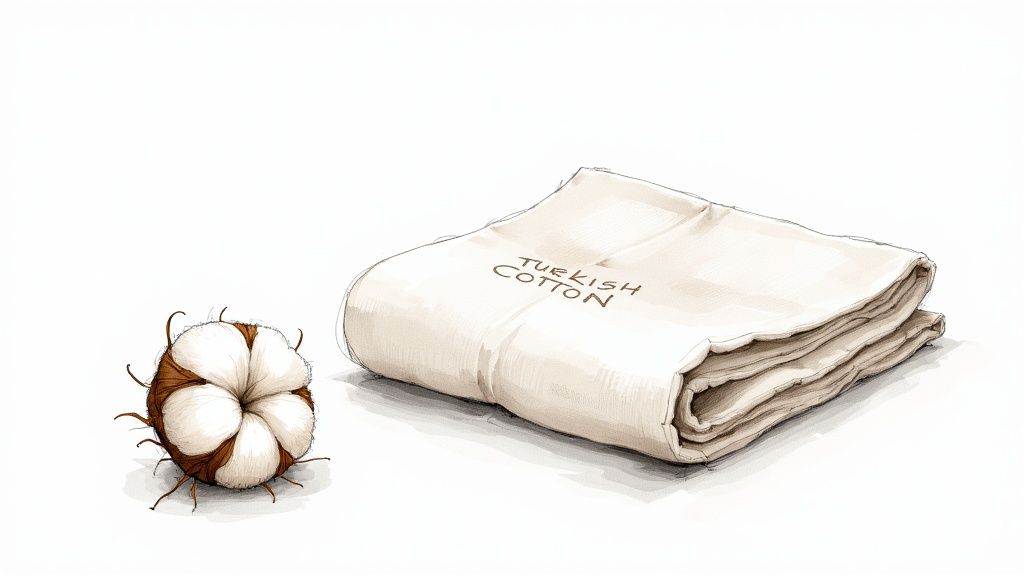
The moment you handle a well-made Turkish towel, you can feel the difference. It's exceptionally soft but doesn't have the heavy, bulky feel you might expect. The secret isn't a chemical treatment or a fancy manufacturing process; it's in the very DNA of the cotton itself—specifically, its extra-long fibers.
Imagine trying to spin yarn. If you use short, choppy fibers, the resulting thread will have countless little ends sticking out, making it feel rough and weak. Now, picture spinning with long, silky strands. The thread is naturally smoother, stronger, and more uniform because there are fewer breaks and connection points. That’s the principle behind Turkish cotton. Its long, elegant fibers create a yarn that is inherently sleeker and more durable.
Why This Fiber Structure Matters
This unique structure is exactly what gives Turkish cotton its most sought-after qualities. The smooth, tight weave feels gentle against your skin, making it a perfect fit for anything you use after a bath or shower. But beyond the immediate feeling of softness, this structure delivers remarkable longevity. Those long fibers are far less prone to pilling or fraying, meaning your towels will look and feel great for years.
The real genius, though, is in its performance. Turkish cotton hits the sweet spot between two critical jobs:
- Exceptional Absorbency: It wicks moisture away from your skin quickly and effectively.
- Fast-Drying: Unlike overly dense cottons that can stay damp for hours, it releases moisture into the air efficiently. This prevents that musty, mildewy smell that often plagues bathroom linens.
In essence, Turkish cotton is practically engineered by nature for the perfect bath experience. It gives you the plush comfort you crave with the fast-drying, practical performance you actually need.
This blend of softness, strength, and quick-drying power is precisely why people who value quality consistently choose it. It’s not just about how luxurious it feels out of the package, but how it continues to perform—and even improve—wash after wash, often becoming softer and more absorbent over time.
To put it all together, here’s a quick breakdown of what makes Turkish cotton special.
Turkish Cotton At a Glance
The table below summarizes the key characteristics of Turkish cotton and what they mean for you and your home.
| Characteristic | Description | Benefit for You |
|---|---|---|
| Long Fibers | The individual cotton fibers are longer and smoother than standard cotton. | Creates a stronger, smoother yarn, resulting in incredibly soft and durable textiles that resist pilling. |
| Flat Weave | The fibers are woven into a flat, tight structure, unlike the loopy terry cloth of other towels. | This makes the fabric lightweight, highly absorbent, and exceptionally fast-drying. |
| Natural Sheen | The smooth surface of the long fibers gives the finished fabric a subtle, beautiful luster. | Your towels and textiles have a more luxurious, high-end appearance that lasts. |
| Aegean Origin | Grown in a unique climate with ideal conditions for producing strong, premium cotton. | This regional exclusivity ensures consistent quality and the signature characteristics people love. |
Ultimately, these unique traits work together to create textiles that don't just feel good but perform brilliantly in your everyday life.
From Ancient Anatolia to Modern Luxury
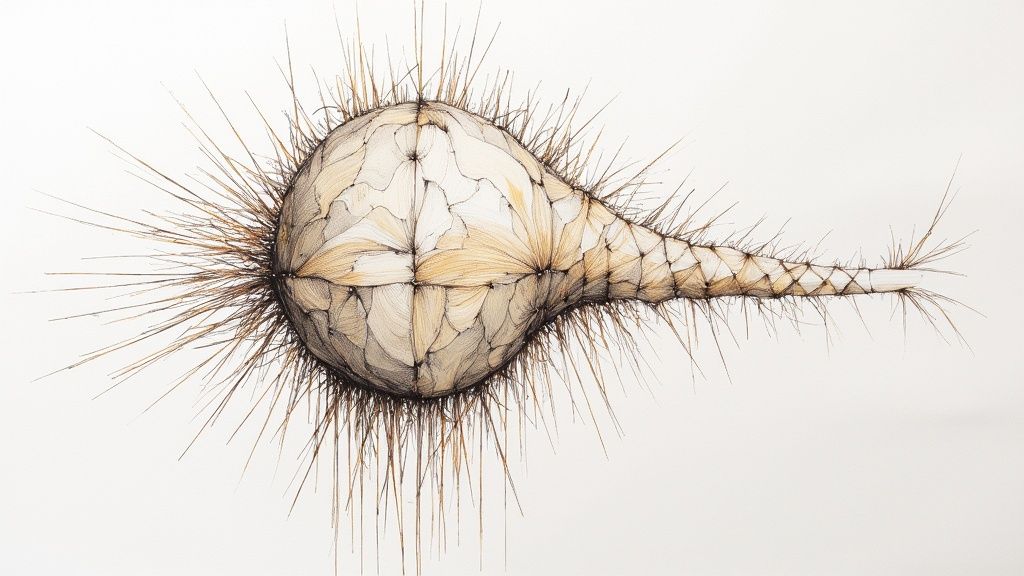
The story of Turkish cotton is more than just fibers and weaves; it’s a journey that starts in the ancient soil of Anatolia, the heartland of modern-day Turkey. For centuries, this region's unique climate has been the perfect cradle for growing this remarkable material. The perfect balance of sun-soaked days and just enough rain created the ideal environment for cotton plants to flourish, developing their signature long, strong, and exceptionally smooth fibers.
This isn't some recent trend. People have been cultivating cotton here for hundreds of years, making it a cornerstone of local life and craftsmanship. Generations of farmers passed down their knowledge, honing the techniques to grow and harvest the cotton that would one day become famous around the globe. It wasn't just a crop—it became part of the cultural fabric.
The Ottoman Empire and the Rise of a Luxury Textile
It was during the lavish era of the Ottoman Empire that the world truly began to appreciate the special qualities of this local cotton. Gifted weavers and artisans transformed it into luxurious textiles that were highly sought after by royalty and the wealthy elite. Its incredible softness, natural sheen, and impressive durability made it the go-to material for everything from fine clothing to royal linens and elegant home textiles that were clear symbols of status.
This period cemented Turkish cotton's reputation as a premium material, forever linking it to a legacy of meticulous craftsmanship. The skill needed to spin its long fibers into silky thread and weave them into beautiful fabrics was a highly respected art form.
At its core, Turkish cotton has always been an artisanal product. Its journey from a sun-soaked field in the Aegean to a finished textile is one of tradition, skill, and an unwavering commitment to quality that has been refined over centuries.
A Central Role in Hammam Culture
Perhaps the most famous role for Turkish cotton is its deep connection to the traditional Turkish bath, or hammam. The hammam is more than just a place to get clean; it's a centuries-old ritual of relaxation, purification, and social connection. The towels used in these bathhouses, called peshtemals, had to be incredibly absorbent but also lightweight enough to dry quickly in the steamy air.
Turkish cotton was the perfect fit. Its unique flat weave allows it to soak up water in an instant while staying thin and easy to manage. Once used, it dries out fast, staying fresh and ready for the next person. This remarkable performance made it essential to the hammam experience. You can learn more about this rich tradition and the role of the hammam in Turkish life.
From the sultan’s palace to the neighborhood bathhouse, Turkish cotton has been a key player in Anatolian history. This deep heritage is woven into every single thread, turning a simple material into a piece of cultural history that brings a story of ancient luxury right into your home.
Why Long Fibers Create Superior Fabric
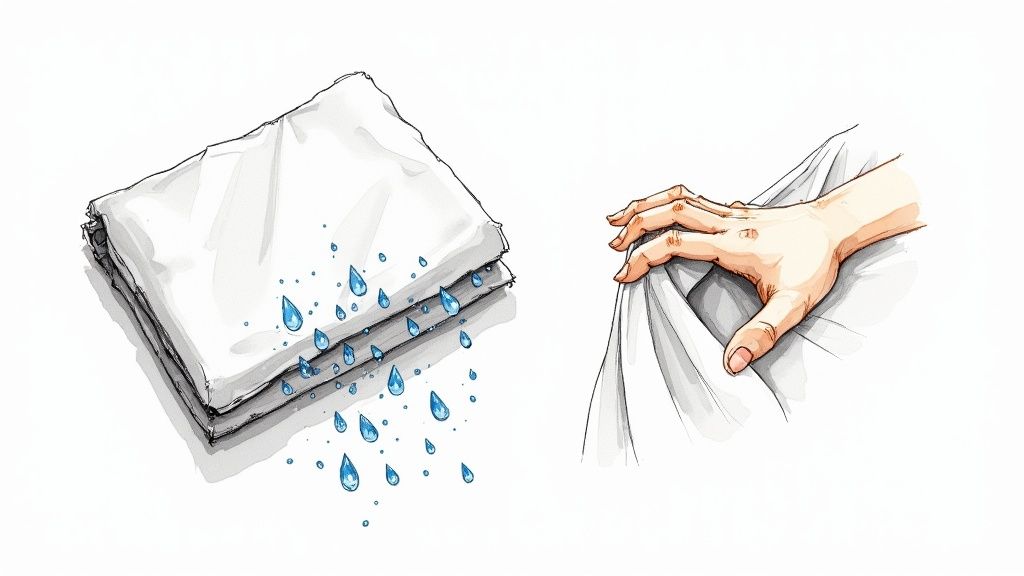
To really get what makes Turkish cotton so special, we have to zoom in on its physical makeup. The real secret isn't just the cotton itself, but the length of its individual fibers. In the textile world, we call this staple length.
Here’s a simple way to think about it: imagine braiding a rope. If you use a bunch of short, choppy pieces of string, the final rope will be fuzzy and full of weak points where the ends meet. It'll feel rough to the touch and will probably start to fray pretty quickly.
Now, picture braiding that same rope with just a few long, continuous strands. The rope you get is instantly smoother, stronger, and far more durable.
That’s exactly what’s happening on a microscopic level with Turkish cotton. Its extra-long fibers get spun into yarn that is simply built better from the start. With fewer loose ends sticking out, the thread is incredibly smooth and strong.
The Impact on Softness and Durability
This stronger foundation translates directly into qualities you can actually feel. The unbroken smoothness of the yarn creates a fabric that feels silky and gentle against your skin, without the slightest hint of scratchiness you might find in lesser cottons.
That inherent strength also means the fabric holds up beautifully wash after wash. You know those annoying little balls of fluff that pop up on cheap fabrics? That’s called pilling, and it happens when short fibers break and get tangled. Because Turkish cotton’s fibers are so long and securely woven, it naturally resists pilling and keeps its smooth, clean look for years.
The secret to Turkish cotton's lasting luxury lies in a simple principle: stronger, longer fibers create a stronger, smoother yarn. This results in a fabric that not only feels incredible from day one but also withstands the test of time and use.
This is why the raw material matters so much, especially for items you use every day. To really appreciate Turkish cotton, it helps to be familiar with understanding the advantages of 100% cotton fabric in general and how it impacts comfort and performance.
A Natural Sheen and Luster
One of the most elegant, and often overlooked, benefits of long-staple cotton is its appearance. The smooth, uniform surface of the yarn reflects light more evenly, giving the fabric a subtle, natural sheen. This isn't some artificial shine from a chemical finish; it's a quality that comes directly from the integrity of the thread itself.
This gentle luster gives Turkish cotton products a visual richness that truly sets them apart. Whether it's a bath towel, a robe, or bed linens, that natural gleam is a clear sign of premium material and expert craftsmanship. It’s a visual promise of the quality hiding within.
When you get down to it, the science is clear. The length of the fiber is the fundamental building block of a high-quality textile. From its incredible softness and resistance to wear and tear to its elegant appearance, every benefit of Turkish cotton traces back to this one crucial detail.
Choosing Between Turkish and Egyptian Cotton
In the world of luxury fabrics, two names always seem to come up: Turkish and Egyptian cotton. They’re both known for their incredible softness and long-staple fibers, but they have some key differences that make them better for certain things. Picking the right one is all about understanding what you really need.
Egyptian cotton has a reputation for being the king of absorbency. Its fibers are some of the longest on the planet, which lets them soak up an impressive amount of water. This makes for a towel that feels incredibly dense and plush, but there’s a trade-off—it holds onto that moisture for a long, long time.
Turkish cotton, however, hits a sweet spot. It also boasts extra-long fibers for great absorbency, but the real magic is in its structure. Thanks to a unique flat weave, it dries significantly faster than its Egyptian counterpart.
Absorbency Meets Quick-Drying Performance
Here’s a simple way to think about it: Egyptian cotton is like a thick, luxurious sponge that can hold a ton of water. Turkish cotton is more like a high-end athletic shirt—it pulls moisture away from your skin brilliantly but then lets it go just as quickly.
This fast-drying quality is what makes it so perfect for bath linens.
- No More Mildew: A towel that dries fast is far less likely to get that dreaded musty smell, especially if your bathroom gets steamy.
- Stays Fresher, Longer: Because it doesn't stay damp, the towel feels cleaner and fresher between washes.
- The Perfect Travel Towel: It's lightweight and dries in a flash, making it a no-brainer for trips to the beach, pool, or gym.
The real beauty of Turkish cotton lies in its efficiency. You get all the plush absorbency you want right after a shower, but you don't get a towel that stays damp for hours. It’s simply a more practical and hygienic choice for everyday life.
Take a look at how these different cottons stack up against each other.
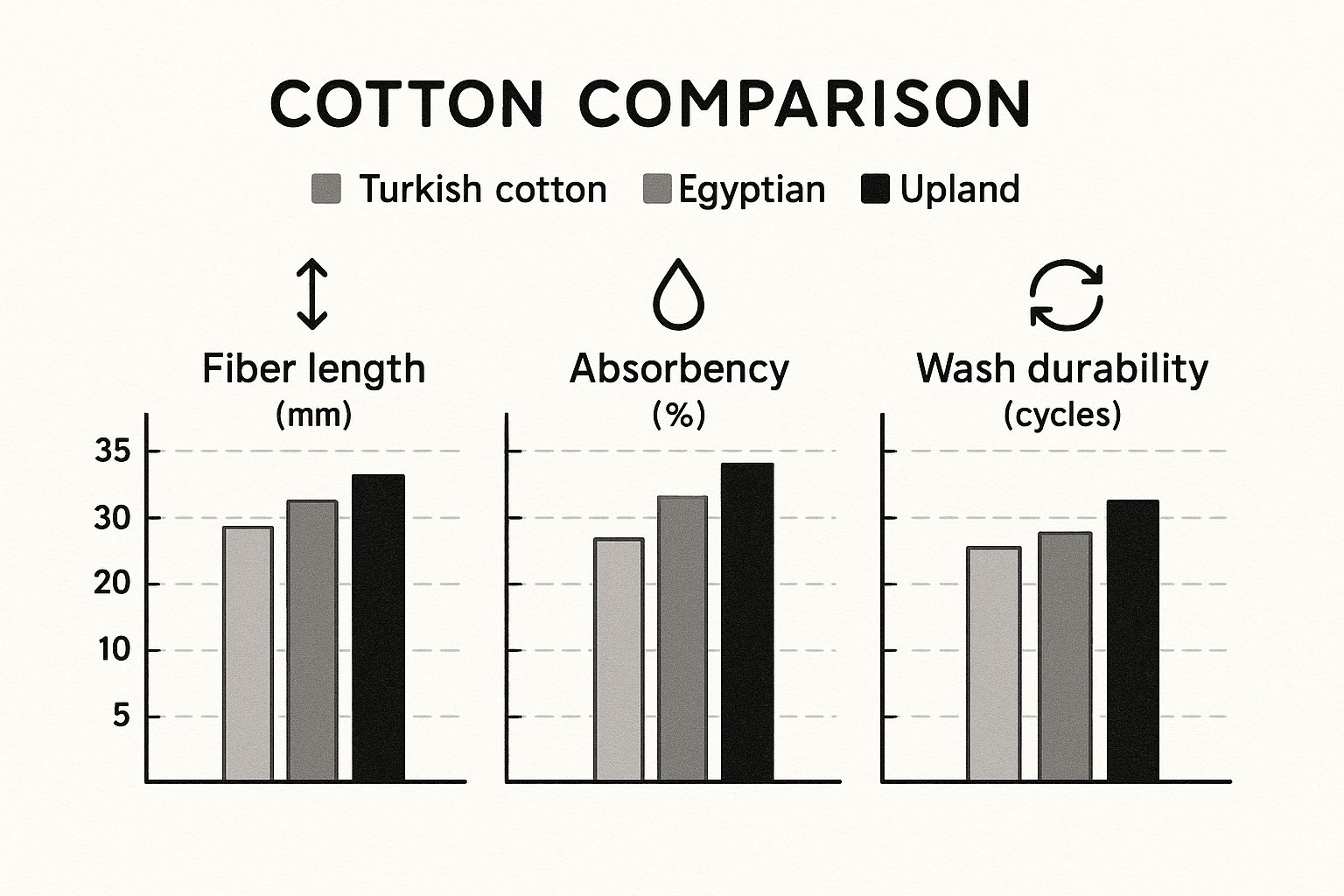
As you can see, while Egyptian cotton has a slight edge in pure fiber length, Turkish cotton really excels in durability and offers a more balanced, versatile performance.
Turkish vs. Egyptian vs. Pima Cotton
To help you decide which premium cotton is right for your home, we've broken down their key features side-by-side. This table offers a quick look at how the world's most popular luxury cottons compare.
| Feature | Turkish Cotton | Egyptian Cotton | Pima Cotton |
|---|---|---|---|
| Fiber Length | Extra-long | Longest | Extra-long |
| Absorbency | High, but balanced | Highest | High |
| Drying Speed | Very fast | Slow | Moderate |
| Softness | Soft, gets softer with use | Extremely soft & plush | Very soft |
| Best For | Bath towels, robes, travel | Bedding, plush bath mats | Apparel, bed sheets |
| Durability | Highly durable, strong fibers | Strong, but prone to mildew | Durable and resists pilling |
While each cotton has its strengths, Turkish cotton's unique combination of absorbency and quick-drying properties makes it the clear winner for bath linens that need to perform day in and day out.
When to Choose Turkish Cotton
So, where does Turkish cotton truly outshine the competition? It’s the go-to choice in situations where you need both comfort and practical performance.
1. Bath Towels and Robes: This is its claim to fame, and for good reason. A Turkish cotton towel gets you dry in a snap and then dries itself out, ready for the next use. A robe made from it feels light and airy, never heavy or waterlogged.
2. Humid Climates: If you live somewhere muggy where towels seem to stay damp forever, Turkish cotton is your answer. Its ability to release moisture quickly is a game-changer.
3. Travel and Beach Trips: Since they’re lightweight, easy to pack, and dry incredibly fast, Turkish towels (you’ll often see them called peshtemals or Fouta towels) are ideal for tossing in a suitcase or beach bag.
In the end, it really comes down to what you value most. If you’re after maximum, sink-in absorbency and nothing else, Egyptian cotton is a solid choice. But for that perfect blend of softness, absorbency, and fast-drying convenience, Turkish cotton is the smarter, more versatile pick.
The Global Impact of Turkey's Cotton Industry
That incredibly soft feel of Turkish cotton you love? It’s more than just a simple luxury. It’s actually a cornerstone of Turkey's economy and a major force in the global textile market. This one material has turned the nation into a powerhouse, celebrated worldwide for its high-quality fabrics.
This strength comes from a simple, powerful advantage: Turkey grows its own world-class raw materials. By cultivating its famous long-staple cotton, the country supports a rich and complex web of industries. It’s a chain that connects generational family farms in the Aegean region to skilled artisans and modern factories, all working to transform raw fiber into beautiful finished goods.
A Driver of Economic Growth
This self-sufficient system is what cements Turkey's reputation as a world leader in premium home textiles. The textile sector is a massive part of the country's economy, and cotton-based products are its biggest star. In fact, cotton products pull in a revenue share of about 42.02% of the entire Turkish textile market, which shows just how vital this single crop is. Smart government policies that support textile manufacturing have also helped fuel this incredible growth. You can learn more about Turkey's significant role in the global textile market.
But the impact goes well beyond the fields and factories. This industry has nurtured a unique culture of design and innovation, blending centuries-old weaving traditions with a modern eye for style. This special mix allows brands to create products that feel both timeless and fresh, striking a chord with a global audience that appreciates true quality and heritage.
Turkish cotton is far more than just a luxury item. It is a vital economic engine that supports thousands of jobs, preserves artisanal traditions, and solidifies Turkey's position as a creator of some of the world's finest textiles.
Of course, this global reach also brings environmental questions into focus. As we all become more conscious of how our products are made, understanding how eco-friendly cotton can be is more important than ever. The story of Turkish cotton is really a story of cultural history, economic strength, and modern-day responsibility.
How to Care For Your Turkish Cotton Towels
So, you've invested in some high-quality Turkish cotton. That's the first step. Now, let's talk about making sure that investment pays off for years to come.
The great news is that keeping these towels luxuriously soft is surprisingly simple. With just a few good habits, your towels won’t just last—they'll actually get better, softer, and more absorbent with every single wash.
It all comes back to those incredible long fibers. When you wash them, they relax and "bloom," creating a texture that just gets better over time. Think of it like a great pair of jeans or a leather jacket; they don't wear out, they break in. Our job is to help that natural process along.
Washing and Drying Essentials
First things first: always wash your towels on a gentle cycle using cold or warm water. Resist the temptation to use hot water, as it can make the cotton fibers shrink and feel stiff over time. A mild, pH-neutral detergent is your best friend here. Also, try not to cram the washing machine full—give your towels room to rinse properly.
Here are the most important things to steer clear of:
- Fabric Softener: This is the number one enemy of a good towel. Fabric softeners leave a waxy film on the fibers. That film repels water, which is the exact opposite of what you want your towel to do. Over time, that buildup completely ruins absorbency.
- Bleach: Harsh chemicals like chlorine bleach are too aggressive for the strong, natural fibers in Turkish cotton. They can weaken the fabric and cause it to wear out much faster than it should.
- High Heat: When it's time to dry, stick to low or medium heat in the dryer. Blasting your towels with high heat essentially "cooks" the cotton, leaving the fibers brittle and scratchy.
For a deep dive into maintaining your towels, our complete guide on how to care for your Turkish towel offers more detailed tips and tricks. This will help you keep your textiles in pristine condition for years.
If you ever feel like your towels are losing their plushness, don't worry. There's an easy, old-school trick: just add a cup of white vinegar to the rinse cycle. It works wonders by stripping away any lingering detergent residue, allowing the fibers to return to their natural, soft state.
You can find even more great tips on how to soften towels naturally to get that ultimate fluff back. By following these simple steps, you're not just cleaning your towels—you're protecting the fabric and making sure they feel more luxurious with every use.
A Few Common Questions About Turkish Cotton
Even after learning about Turkish cotton, some practical questions always seem to pop up. Getting those details sorted out is what gives you real confidence when you're choosing a new towel or robe. We’ve pulled together the most common ones we hear to help you get the full picture.
Does Turkish Cotton Get Softer Over Time?
It absolutely does. In fact, this is one of the most loved qualities of genuine Turkish cotton. The magic is in those long fibers—they're woven to "break in" over time, not break down.
With every wash, the fibers relax and bloom, creating a texture that gets noticeably softer, plusher, and even more absorbent. It's a lot like a great pair of leather boots or your favorite denim jacket; they just get better and more comfortable with age. This is a huge difference from standard cottons that often feel stiff or start to look threadbare after just a few cycles in the machine.
How Can I Tell If a Product Is Real Turkish Cotton?
This is a great question, because authenticity is everything. The easiest first step is to check the label. A quality maker will be proud to state "100% Turkish Cotton" or "Made in Turkey."
But don't stop there—trust your hands. Real Turkish cotton has a distinct feel. It's soft but has a substantial, durable quality to it, and the smooth fibers give it a subtle, natural luster. It shouldn't feel flimsy or artificially puffy, which can be a sign of chemical softeners.
A quick tip: watch out for vague marketing language like "Turkish-style" or "Turkish-inspired." These phrases are often a red flag that you're looking at a blend, or a completely different cotton woven to look similar. You won't get the same quick-drying, long-lasting benefits. Sticking with transparent brands you trust is always the safest bet.
Is Turkish Cotton Good For Sensitive Skin?
Yes, it’s a fantastic choice for anyone with sensitive skin. It all comes back to those long, smooth fibers. When they're woven into a textile, the surface of the fabric is incredibly sleek, with far fewer tiny fiber ends that can poke out and cause irritation.
On top of that, its natural breathability and quick-drying power help keep your skin dry and comfortable, which prevents the kind of damp environment that can make skin issues worse. For total peace of mind, look for products that are OEKO-TEX certified. This certification is your guarantee that the textile is completely free from harmful chemicals and synthetic additives, making it genuinely safe for even the most delicate skin.
At Anatolico, we're all about the authentic beauty and performance of true Turkish cotton. Every one of our small-batch towels, robes, and home goods is woven by master artisans in Turkey, ensuring you receive a product that is as genuine as it is luxurious. Explore our collection and feel the Anatolico difference for yourself.

